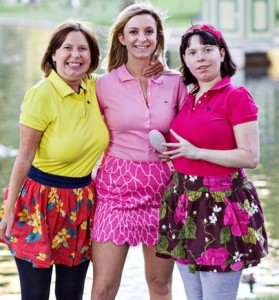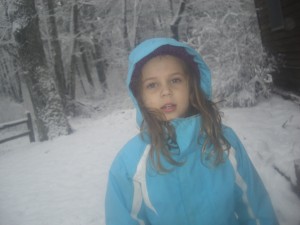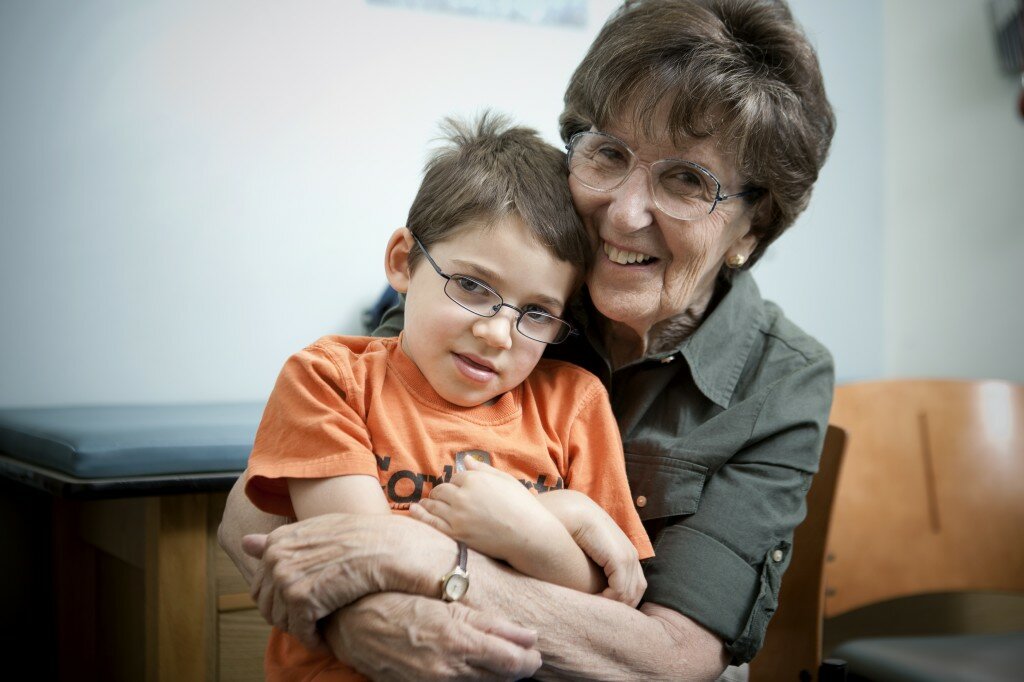When we moved our family almost 3000 miles away from their cousins, I knew the separation would be hard.
My girls and my sister’s boys have grown up together since birth. They love Lilly for who she is and have never seen her as any different than that. After a horrific trip home this past summer, I soon realized flying across country with my autistic angel just might not be in the cards for awhile.
How was I going to keep the connection going?
My angel loves watching pictures and videos of the boys, but never asks for them or does more than a whine and then kiss on the phone. I just had to keep the faith to talk to both my daughters equally about their boys in California, show pictures, tell stories. One of the difficult aspects of autism is not knowing what their minds are absorbing. I know my Lilly is extremely bright, but it’s never easy or normal to not receive answers to questions we try to ask her.
A couple weeks ago, I was blessed with a sneak peek inside her precious mind. Every day around noon the doorbell rings, and I prompt Lilly to go answer it. It is always one of her amazing therapists arriving for her in-home ABA therapy. On this day, she pranced through the hallway, long legs and tip-toes as always, but cried when she opened the door. To my complete and utter amazement, she whined, “No Miss __.” “Dane! Dane!”
There it was. More than a year from moving away, she asked for her adoring cousin. I immediately jumped on FaceTime with my sister so Lilly could see his face, but more importantly so my nephew knew she was here, asking for him. I ran into the kitchen, grabbed his proud soccer picture from the fridge and put it in her therapy room. My gut told me to keep the momentum going. I felt this strong urge to hold onto this seemingly unimaginable moment forever.
 She has not asked for him since, but found a Batman mask given to her by the boys on our trip home. Lilly had regressed on that trip — humming constantly, little to no language, wandering — and the only thing that seemed to calm her was the mask. It acted as a comfort, an escape: heartbreaking and adorable wrapped in the same breath.
She has not asked for him since, but found a Batman mask given to her by the boys on our trip home. Lilly had regressed on that trip — humming constantly, little to no language, wandering — and the only thing that seemed to calm her was the mask. It acted as a comfort, an escape: heartbreaking and adorable wrapped in the same breath.
Of course my generous and loving nephews let her keep it.
Lately, and, honestly, most of her life, Lilly’s bedtime routine has been a nightmare to say the least. So last night, when she insisted on bringing the hard plastic mask to bed, I didn’t flinch. Anything to calm her and not cause aggression and a meltdown, I figured.
As if she was recalling a memory, my sweet girl slid the mask on, smiled one of her room-lighting, angelic grins, and peacefully closed her eyes. My heart sang: confident that this one simple toy is serving as a link, a physical connection to recall her memory of time spent with her boys.
Most people wear a mask to keep the world out, but Lilly wears hers to let the world in. I bet Batman never knew he had the ability to save a little girl like this.



 As an older sister to two incredible, beautiful, amazing girls with autism, I am extremely grateful for the amount of support from donors that help keep The Autism Research Foundation running. Since I was able to speak and to think on my own, I’ve known that my most important role in life would be to be my sisters’ voice.
As an older sister to two incredible, beautiful, amazing girls with autism, I am extremely grateful for the amount of support from donors that help keep The Autism Research Foundation running. Since I was able to speak and to think on my own, I’ve known that my most important role in life would be to be my sisters’ voice.

 Now, in our 4th holiday season, we have a game plan that suits our family’s needs. Just like the beautiful snowflakes that fall — unique in their nature and appearance — so are our angels with autism. Listening to her needs, verbal or not, makes for a better holiday season.
Now, in our 4th holiday season, we have a game plan that suits our family’s needs. Just like the beautiful snowflakes that fall — unique in their nature and appearance — so are our angels with autism. Listening to her needs, verbal or not, makes for a better holiday season.



 Pioneering autism researcher and child neurologist, Dr. Margaret Bauman, answers your frequently asked questions: from early intervention to adult care. Share her insight with your autism community and check back often for new discussions about improving quality of life for individuals with autism.
Pioneering autism researcher and child neurologist, Dr. Margaret Bauman, answers your frequently asked questions: from early intervention to adult care. Share her insight with your autism community and check back often for new discussions about improving quality of life for individuals with autism.


